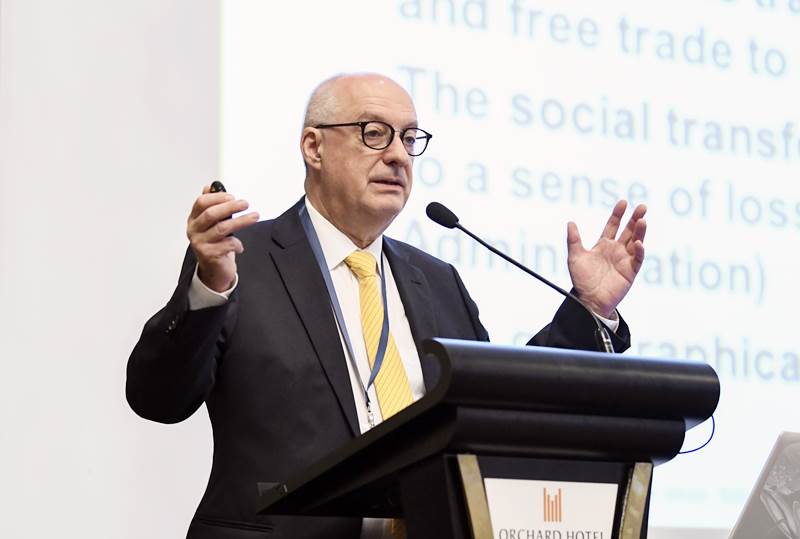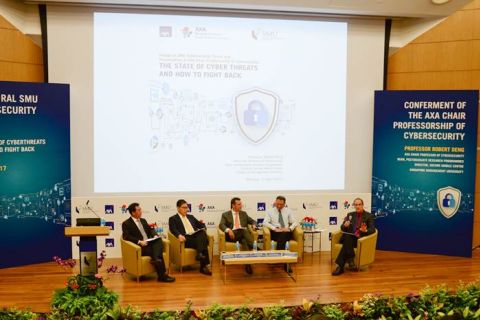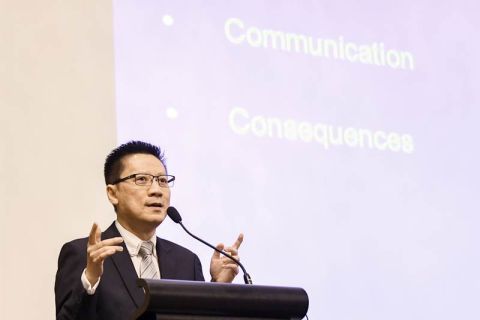
Back to Research@SMU Events Feature Series
By Sim Shuzhen
SMU Office of Research & Tech Transfer – Twenty years ago, university students in search of information had to make the trip to a brick-and-mortar library to seek it out. But the situation today is quite different, with journals, databases and other repositories of information easily accessible over the internet. The world has moved from information scarcity to information overload.
In addition to this digital transformation, the world has also changed profoundly in many other respects. The global centre of economic activity is shifting from West to East, and events such as Brexit and the election of the current US administration will certainly have far-reaching consequences.
How should Singapore navigate these fast-changing, unpredictable global waters? According to Singapore Management University (SMU) President Professor Arnoud De Meyer, the key lies in the country’s capacity for constant innovation. But in order to build such a culture of innovation, some degree of chaos and a diversity of opinions may first be required, he added.
Professor De Meyer was speaking on 24 February 2017 at the SMU Behavioural Sciences Institute’s (BSI) conference on the theme of ‘Unintended Consequences in Singapore’. The annual conference, BSI’s sixth, was attended by some 350 people from academia, government and the private sector.
Innovation – the key to staying relevant
Along with the rest of the world, Singapore’s economy has also undergone a transformation, said Professor De Meyer. “We are living in a much more mature economy. We've moved from serving principals – such as Japan, Europe and the US – to having a set of strong local sectors, including advanced manufacturing, logistics, financial services, petrochemicals and health management.”
Instead of inventing new “silver bullets”, Singapore has realised the importance of deepening its capabilities in these existing sectors, he added. This involves investing in the “soft aspects” of a thriving economy – research and development expertise, global networks, innovative business models and entrepreneurship skills, for example. This is more complex than investing in hard infrastructure such as roads and fibre optic cables, which Singapore already has in abundance.
In the past, Singapore used to look to other industrialised countries as economic models to emulate and copy. But in a constantly evolving world, said Professor De Meyer, this set of examples is quickly drying up.
In the absence of a playbook to copy from, Singapore must fulfill one critical requirement in order to continue to adapt and thrive. “The key word for me is very simple – it's all about innovation,” said Professor De Meyer.
Singapore’s innovation report card: there’s room for improvement
In several respects, Singapore might already be considered on par with innovation hubs such as Silicon Valley, London and Paris. For example, it has strong research and development capabilities, excellent technical infrastructure, and robust legal and business frameworks, said Professor De Meyer.
But it could do better in other areas. For example, being located far away from the US and Europe, Singapore suffers from a lack of access to sophisticated markets. At the same time, entrepreneurs here tend to neglect large nearby markets such as Indonesia and Vietnam. One example that Singapore could look to, said Professor De Meyer, is the city of Tel Aviv, Israel. Tel Aviv, which due to geopolitical reasons has difficulties exporting goods to neighboring countries, has nevertheless cultivated good relationships with the US, thus opening up markets there.
In addition, although startup capital is abundant in Singapore, and banks are willing to make loans to large companies, there is a lack of growth capital that is targeted at companies in the in-between phase, said Professor De Meyer. “I'm very optimistic about startups in Singapore, but not so much about having real growth. Companies seem to go overseas to get financial support.”
Importantly, Singapore needs to develop a culture that encourages innovation. “We need to have respect and reward for creativity,” said Professor De Meyer. “We need role models who show how you can be successful by coming up with a crazy idea and translating it into a business or service.”
Singapore has already improved in this respect, he said. Parents are now more receptive of their children taking on non-conventional careers, which have traditionally been seen as less stable. “Today, when our students have creative ideas and want to set up a company, they are not considered to be failures by their families,” he quipped.
Accepting messiness, chaos and diversity
Overall, Singapore has enormous potential as an innovation hub, said Professor De Meyer. But, he added, becoming a truly great innovation capital will involve more than simply putting in place hard and soft infrastructure.
First, Singapore needs passionate, non-conformist innovators. “Innovators can be nasty and unpleasant to work with – they disrupt the equilibrium in society,” said Professor De Meyer. “I sometimes wonder if our people have that passion to go against the accepted ways of doing things.”
Second, most innovation hubs are highly tolerant of a certain level of messiness and creative chaos, as well as of a diversity of opinions. Professor De Meyer questioned whether Singapore society, renowned for being well organised, would be able to accept this. “It's out of the interaction of different ideas that light will shine,” he added.
In closing, Professor De Meyer suggested that policy-makers explore other ways of doing things in today’s highly complex and uncertain environment – Darwinism, for example, in which many projects are run at the same time to see what works and what does not; or flexible, pragmatic approaches which can adapt and cut losses quickly.
“We need to realise that Singapore has to constantly reposition itself within this dynamic world,” said Professor De Meyer. “The position we've taken – that we’re a very wealthy, well-organised island state operating in this messy world – needs to be challenged every day.”
See More News
Want to see more of SMU Research?
Sign up for Research@SMU e-newslettter to know more about our research and research-related events!
If you would like to remove yourself from all our mailing list, please visit https://eservices.smu.edu.sg/internet/DNC/Default.aspx

